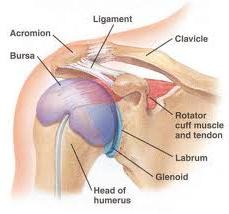Shoulder pains are a common complaint from the elderly, from the physically active in middle age, and from those sustaining workplace injuries or auto accident pain. The approach to diagnosing its cause is to consider whether the pain is from the shoulder or  referred pain from nearby structures. The pain can be muscular or skeletal in origin and can share clinical features so a thorough evaluation is needed to come up with a focused treatment goal.
referred pain from nearby structures. The pain can be muscular or skeletal in origin and can share clinical features so a thorough evaluation is needed to come up with a focused treatment goal.
Anyone with shoulder pains may experience difficulty in carrying objects, inability in moving the arm, or note signs of inflammation such as swelling, tenderness and redness. Medical attention should be sought to narrow down the cause of the shoulder pain. Shoulder pains may be caused by acute injuries which may need immediate medical treatment. This includes rotator cuff injuries, shoulder dislocation, shoulder separation and fractures.
It’s not always clear whether the pain is actually coming from the shoulder. A herniated disc in the neck may radiate pain into the shoulder for instance. The Board Certified work comp specialist at Arizona Injury Medical Associates will thoroughly evaluate the pain to delineate the exact source.
Shoulder pains may also stem from overuse injuries. In this case, usually the symptoms develop when there is repetitive and excessive use of the shoulder during daily activities  like gardening and cleaning, or working a position that requires continuous activities. The encountered conditions arising from overuse are inflammatory diseases such as bursitis and tendinitis, osteoarthritis, muscle strains and impingement syndrome.
like gardening and cleaning, or working a position that requires continuous activities. The encountered conditions arising from overuse are inflammatory diseases such as bursitis and tendinitis, osteoarthritis, muscle strains and impingement syndrome.
The primary goal is to alleviate pain which can often be taken care of by conservative measures such as NSAIDs and doing the R. I. C. E regimen which stands for rest, ice, compression, and elevation.
At times, however, it may become necessary to initiate a physical therapy regimen and obtain an injection in the shoulder joint or subacromial space. A personal injury doctor can accomplish this with ultrasound guidance. Medication management for acute flareups may be necessary as well.






Leave A Comment